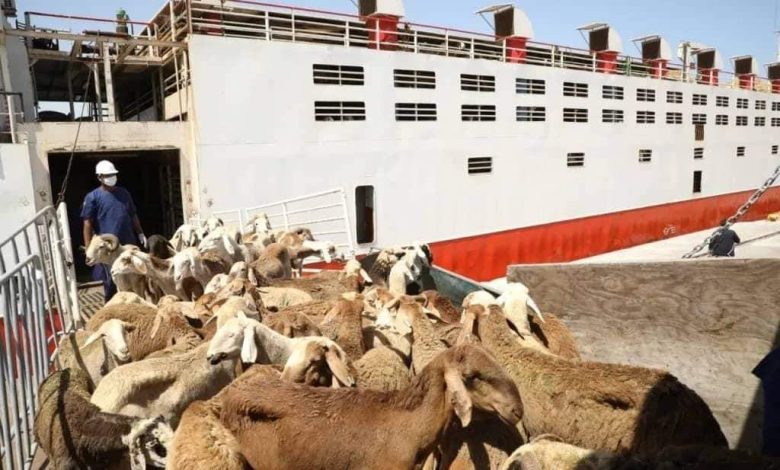Advance Payment for Exports…Pursuing Economic Sabotage

Report – Rehab Abdullah
Reactions varied regarding the circular of the Central Bank of Sudan, which stipulated the export of live livestock through advance payment, after the central bank clarified the purpose of the circular, which is the provisions of procedures for recovering proceeds from exported livestock. The central bank called on banks to direct customers to refer to the Ministry of Trade and Supply to reconcile the status of their existing contracts for which export forms have not yet been issued, or for which shipments are being made.
Differing viewpoints
Some consider that the timing was wrong in the sense that Sudan is living in exceptional circumstances due to the war, and therefore the procedures are supposed to be facilitated and not complicated, noting that differed payment has become a feature of dealing, at a time while some consider that the decision is very important and came at its timing in the sense that the government is suffering from a lack of revenues after a long stoppage of activities, in addition to the fact that the decision guarantees that the proceeds issued will be returned and not tampered with, and perhaps there is another opinion from two sources who called for giving some people a period to reconcile their status, given that some have existing transactions and contracts for future periods.
Responsibility of the Bank of Sudan
The Undersecretary of the Ministry of Livestock, Dr. Hassan Al-Tom, approved the step of Central Bank of Sudan issuing a new circular in which it required advance payment for exported livestock, in addition to banning companies, including those specializing in livestock exports, from exporting on the grounds that they had due to negligence in returning the proceeds of the export, and Al-Tom told (Al-Ahdath) that export revenue is the responsibility of the Bank of Sudan, and livestock is the technical authority that requires the expertise of workers to ensure the success of the export and prevent the ships from returning for technical reasons. Therefore, Al-Tom believes that any step taken by the Bank of Sudan that helps in the return of export proceeds will find encouragement and support from his ministry, considering the Bank of Sudan, the Ministry of Trade, the Ministry of Finance, and the Sea Ports Authority are export partners.
Pointing out that the Bank of Sudan’s step coincided with other steps by the Ministry of Trade, including controlling exporters’ records and preventing random licenses, which would eliminate evasion forever. stealing the country’s resources
At a time when the former rapporteur of the Livestock Export Division, Khaled Wafi, clarified that the circular was attached to the circular prohibiting export companies, which included companies that export livestock and meat, pointing out in his statement to (Al-Ahdath) that the list of companies that the Bank of Sudan had warned was issued for export entitlements that were supposed to be due. These companies were supposed to pay them before the outbreak of war, that is, before last April 15.
Wafi called on the Central Bank of Sudan to issue a list of the names of the companies concerned.
He said that the export operations that took place during the past nine months resulted in the theft of the country’s resources by weak-hearted people, and through the laundering of the Sudanese people’s money that was looted during the war.
Amount of Loss
The loss of export revenues after the war was estimated at one billion dollars, and the tax and Zakat losses at about 135 billion Sudanese pounds.
Wafi accused the parties that carried out these export operations of seeking to strike and sabotage the Sudanese economy.
He stressed the importance and speed of pursuing the recovery of these funds to the public treasury.
Export distortions
On his part, the economist, Dr. Haitham Mohammad Fathi described the policies of the Central Bank of Sudan towards exports and imports as fluctuating and unstable, indicating the decline in export revenues as a result of some previous policies, which opened the door wide for those evading payment of export revenues. He indicated in his statement to (Al-Ahdath) that the method of advance payment in exports is one of the methods used. Internationally, in global trade operations, there are many different ways. It means the payment method by which the importer pays the price of the goods before the actual export. In this payment method, the exporter does not bear any risks, while the importer bears the risk of loss for reasons such as not sending the goods or not complying with the order list.
He confirmed that approving advance payment for exports is considered the surest way for the government to ensure the return of all export revenues to the treasury of the Central Bank of Sudan, and he pointed out that the Sudanese economy is suffering now after the war approached a year, during which the country and its internal and external trade were destroyed, while the economy faces the problem of the trade balance deficit as a result of weak exports and an increase in import volume,
At the same time, calling for implementing the electronic system and working with a single window system to facilitate control over imports and exports and reviewing the fees imposed on local products, in addition to controlling the export of gold, cotton, Gum Arabic and sesame,
He said that dealing with exports is plagued by distortions, with production not being used for the benefit of export despite the great opportunity available to the country under a circumstance completely different from the circumstances of other countries, in addition to the instability in the Central Bank’s circulars regarding export and import.
He continued, export operations to neighboring countries must be dealt with in all known ways, such as LCs at sight, (deferred) LCs, advance payment, payment against documents, and documents against acceptance.



